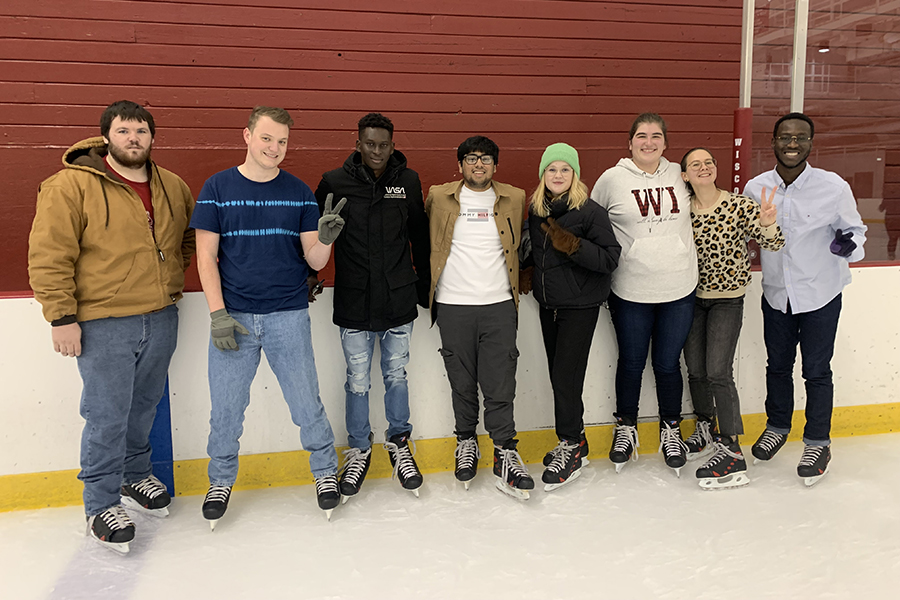Helping international students make connections
Members of the Cultural Connect program visited an area ice arena to skate.
February 15, 2023
Did you know Madison College’s Center for International Education has a program that pairs U.S. students with International Students in a semester-long peer mentoring partnership? It’s a chance to enrich your appreciation and develop insight into different cultural backgrounds. Ideally, it motivates students to be creatively and culturally inspired.
The Cultural Connect program was developed to connect lives and has no age or education requirement. While the typical age is 18-25, all ages are welcome and encouraged.
The application process doesn’t come with any education criteria. As long as you’re a student taking classes at the college, you are eligible to participate.
“We genuinely want people who want to share culture to be the ones participating,” said Dilyn Riesterer, International Student and Education Abroad Specialist.
Riesterer emphasizes commitment to the program, with participants carrying out their roles through the end of the semester.
The first step is an informational interview with students, getting to know the participant better based on similar interests or wanting to learn the same language. The Center assesses who they would partner with, creating matches with similar goals.
Connecting with a mentor who shares the same interest was important to Brice Conseibo, Cultural Connect program coordinator, who was also mentored as an international student through the 2017-2018 semesters.
“I was part of the soccer team — the student manager of the Madison College soccer team,” said Conseibo, who is originally from Burkina Faso, part of West Africa. “Being paired up with someone who also enjoyed soccer was a great thing.”
Nearly six years later, Conseibo is still in touch with his mentor, texting often and getting together on weekends.
“It makes your life more interesting being on campus – being part of a club with students who share the same passion or interest as you, it helps you become more successful.”
Once the program begins, the Center holds a group orientation page through the handbook, setting program expectations and discussing cultures. This meeting isn’t a breakdown of specific cultures but an overall look at how to develop cultural insight.
Riesterer, who earned a master’s in global higher education from the University of Wisconsin-Madison, discussed educating students on the Iceberg Cultural Model, discovering cultures above and below the surface.
As she explains, the top of the iceberg is the behaviors and practices of a culture that one can see. The part of the iceberg that’s under the water is the perceptions, attitudes, beliefs and values of a culture.
They encourage participants to dig deeper underneath the water and understand the “why” behind external cultural aspects that are easy to see and observe, such as the type of clothes a person wears.
The Center holds about five group events each semester, focused on developing relationships with the Cultural Connect community. Events like Ice Skating Bonfires, Memorial Union visits, potluck dinners and local activities are offered.
In addition to group activities, mentors participate in partner or small group activities. Partners can do as little as walk around campus or get a coffee. Smaller groups provide variety, like two or three sets of partners going to Chicago or Milwaukee and making day trips.
Conseibo encourages international students to be flexible, broadminded and willing to try different things. “Try to say ‘yes’ to pretty much anything.”
While Conseibo enjoyed and appreciated his partnership, he wishes he would have done more activities when suggested, like an opportunity to ski.
“I would have said ‘yes’ more because my partner was more dynamic than me, but I was also busy with the soccer team.”
Conseibo still thinks about the lost ski trip.
“I haven’t gotten the chance to do it since, so be more open-minded and say ‘yes’ to new things,” Conseibo said.
Riesterer said there are 18 mentors this semester but stressed that mentoring goes both ways.
“As much as we want our U.S. students to help our international students integrate into the Madison College community, we also want our international students to feel like they have a space to share their culture, especially with people who are genuinely interested in it.”
The program encourages curiosity. Riesterer mentioned that in the United States, we often assume that we can’t ask people questions for fear of offending people or not wanting to say the wrong thing.
While they want their students to appreciate empathy and sensitivity towards others, the Center encourages interest and inquisitiveness.
“We want a safe space for international students to be excited about talking about their culture, the color of their skin and their lives, sharing that with everyone,” Riesterer said.
“This program is a great opportunity for students to feel safe to ask questions — but also international students to share their culture with us, students who might not otherwise get the opportunity to meet others from different countries.”
Asked if she had any advice for potential participants, Riesterer said, “Ask a lot of questions. Be open-minded. Commit to the program. I have seen students who have come out with a whole new perspective on another culture after participating.”































